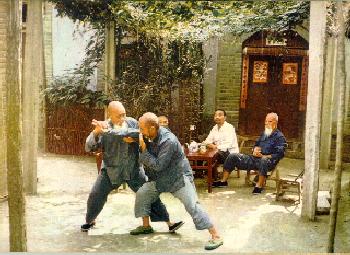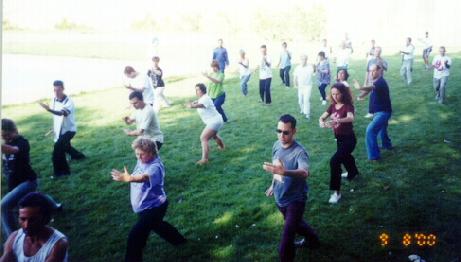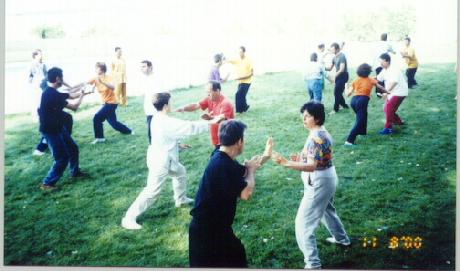October 2000 (Part 1)
SELECTION OF QUESTIONS AND ANSWERS

Two elderly men in a Chinese village practising Taijiquan Pushing
Question 1
As regards class development, should the Taijiquan instructors emphasize relaxation? They say they don't remember that you taught them how to relax in the Taijiquan courses.
— Sifu Adalia Iglesias, Spain
Answer
Relaxation is of utmost important in Taijiquan and all internal arts. If one cannot relax, he (or she) cannot manage internal force. In the Taijiquan courses (in Segovia, Spain in August) I taught everyone to relax, not just once or twice, but all the time, and everyone did well. If they had not relaxed, they would not have the results that they had, such as having remarkable internal force, and feeling joyful and peaceful inside -- results which many of them reported to the class during discussion.
The way I taught them relaxation was different from what they might have imagined. That is why they might not remember my teaching them relaxation. I did not, for example, say, "Listen, you are going to learn relaxation. First you have to do this, then this, and this and this." This is text-book teaching, what many Taiji readers (in contrast to practitioners) might expect.
My teaching was informal. By various subtle ways I got the students to relax, even before they realized it. Later they could relax on their own, with little or no help from me. Only when they were relaxed and focused, could they proceed to other Taijiquan skills. This is an example of transmission of skills, which is qualitatively different from listing of techniques.
Do you remember the time we did combat application where even small sized women could throw big sized men to the ground. If the women were not relaxed they could not have done that -- had they tensed their muscles in their throws, the women would not have sufficient physical strength to throw hefty men. I recall one woman coming up to me and telling me that it was much easier than what she thought.
The interesting point is that that woman, like all others during the combat application practice, was not bothered about the various steps she must do to relax and to throw a hefty man to the ground. She just relaxed and threw him, which she did elegantly.
But how did she do it? It is like asking how did she walk. She just walked. In the same way she just relaxed and threw him to the ground. Such skills, of course, must be learnt personally from a competent teacher, who not only must have the skills himself but also can transmit the skills to his students methodically.
If that woman merely read the instructions from books or webpages, even if the instructions were clear and she understood them well, she could neither be relaxed nor throw a hefty man. This is one of many reasons I have so often mentioned that arts like kungfu (including Taijiquan) and chi kung need to be learnt personally from a competent teacher.
Question 2
One of the main reasons I enrolled to learn kung fu besides self defense was the chi kung internal aspects described in your books and on your web page. My first question is when is chi kung traditionally introduced into a student's kung fu practice.
— Eric, USA
Answer
This depends on the teacher, and his decision will be influenced by such factors as philosophy, training and objectives.
Traditionally, a student had to spend a few years in kungfu before formal chi kung was taught to him, although chi kung was actually incorporated informally in his first lessons. For example, when he practised his basic stances for a few months (not learned the stances in a few minutes) at the start of his kungfu training, he was practising chi kung.
Today, especially when kungfu is taught as a sport or performing art, chi kung is usually not taught at all throughout the entire learning career of the student. A kungfu or wushu student today learns sets after sets for solo performance.
However, in my kungfu school, which is very different from the mainstream, there is no difference between chi kung and kungfu. Indeed at the beginning stage, a kungfu student spends most of his time on chi kung exercises like "Lifting the Sky" to generate energy flow, and stance training to develop internal force, before he learns kungfu forms. Even when he performs kungfu forms with the main purpose to practise combat techniques, the student has to regulate his breathing correctly and channel his internal force, which are chi kung aspects.
Question 3
My second question is I had seen in a kungfu magazine a Shaolin monk demonstrating warm up stretching exercises. These were referred to as external chi kung movements. Is this true that standard warm up stretches are considered chi kung? Is this part of what is called "Sinew Metamorphosis"?
Answer
It is a matter of terms, and different people would use different terms. I would not regard stretching exercises as warm-up exercises. They are flexibility exercises and are regarded as external chi kung if the student actively works on his energy besides working on his muscles and joints. If he merely stretches his muscles and loosens his joints, which by themselves are also beneficial, it is not external chi kung but just physical exercise.
To make the idea clearer, if the student has only the benefits of stretching his muscles and loosening his joints, he is doing physical exercise, which may or may not be his warm-up exercise too. But if by performing the same exercise, besides stretching his muscles and loosening his joints he also has the benefits of energy flow, he is doing chi kung.
In chi kung and kungfu, there is no need for warming up. A chi kung or kungfu exponent can start his training with any exercise.
Stretching exercises and Sinew Metamorphosis are very different. Stretching exercises are elementary, whereas Sinew Metamorphosis is advanced. By just training Sinew Metamorphosis and nothing else, an exponent can break bricks with his hands and arms, and take weapon attacks on his body without sustaining injury.

Sifu Wong's Taijiquan class in Segovia, Spain in August 2000
Question 4
I recently purchased a book on Tai Chi Chuan and I was wondering if it is alright to practise Tai Chi Chuan individually.
— Grabiel, Malaysia
Answer
By practising individually I reckon you mean you learn on your own from books, videos, etc, without someone to teach you personally. If you just want to while away some time, you can do so, but it is sure that you will not be performing Tai Chi Chuan. At best you will be performing some Tai Chi forms, which for convenience I call Tai Chi dance.
Tai Chi dance is not without its benefits, otherwise there will not be so many people in the world doing Tai Chi dance for years. You can, for example, loosen your muscles and relax yourself.
Question 5
This question came to my head as I can't find a proper master to guide me but seriously I have a great interest in this art.
Answer
In Malaysia and other eastern countries, it is not difficult to find teachers teaching Tai Chi forms. But to find a real Tai Chi Chuan master it is very difficult anywhere in the world, even in China.
Perhaps it is a matter of semantics, but personally I would not consider an art that only teaches external Tai Chi forms but without teaching internal force and combat application using those Tai Chi forms, as genuine Tai Chi Chuan. My opinion is not mainstream. In fact mainstream Tai Chi Chuan, as the term is used today, does not pay attention to internal force and combat application.
If you wish to learn Tai Chi Chuan as it was practised by past masters where internal force and combat application are crucial, you have to seek a master and learn from him personally. If you are not initiated, it is impractical for you to learn internal force and combat application from books or videos, or from someone who himself has no internal force and knows no combat application.
But if you are satisfied with external Tai Chi forms, you can easily find instructors eager to teach you, sometimes for free, or you can learn from books or videos.
Question 6
I have a so-called incurable disease called ulcerative colitis. My immune system no longer works properly and is attacking my large colon and eating it alive from the inside.
— Michael, USA
Answer
According to chi kung, there is no such a thing as an incurable disease. This, unfortunately, does not mean that every patient can be cured of his disease. If his disease, even a simple one, has gone beyond a threshold, it may not be cured.
Chi kung looks at illness and health from a different perspective. It may sound crazy to those used to the Western medical perspective, but from the chi kung perspective, illness -- any illness -- is due to disharmonious energy flow. Hence, a chi kung master or therapist would not bother whether your immune system is eating your colon from inside or outside; but what he is concerned is to restore your energy flow. Once your energy flow is restored, you will regain your health. When you have regained your heath, you will not have what Western doctors call ulcerative colitis.
What you should be concerned is not whether your illness should be called ulcerative colitis or disharmonious energy flow. What you should be concerned is whether you can regain your health, or in Western terms whether you can be cured of your illness, irrespective of what name you or other people may choose to call it.
Question 7
When I had my worst time of internal bleeding two years ago, I tried to continue chi kung during the attack and ended up in the hospital in great pain and very sick. I was told to stop doing chi kung. Once I stopped, the medications stopped the bleeding.
Answer
The forte of chi kung is to restore harmonious energy flow. This means that in theory practising chi kung would enable you to restore your energy flow, which is another way of saying regaining your health.
But in practice this may not happen. This is due to various factors. One important factor is that you only practised gentle exercise, although you thought you did chi kung. This has happened to most people, especially those who think they can learn chi kung from a video or an e-mail, or from any Tom, Dick and Harry.
Another important factor is that even what you practised might be genuine chi kung, you practised wrongly or insufficiently. Another contributing factor could be that the disease causing agents were so powerful that your chi kung practice could not cope with them.
Your ending up in hospital and being very sick after practising chi kung could be due to various reasons. A likely cause was that you practised wrongly and aggravated your situation. This is not uncommon nowadays when many people have so little respect for this ancient art, thinking that any Tom, Dick and Harry could pick up some chi kung exercises from books and start practising them on their own, or even teaching them to others. It is like reading up some medical or surgical texts and start prescribing powerful drugs or operating on themselves.

Students engaged in combat training in Sifu Wong's Taijiquan class
Question 8
Even now, two years and a half later, whenever I try to do any chi kung, I get massive stomach cramps and diarrhoea within 2 hours. If I do chi kung for more than 2 days I start bleeding again.
Answer
It is probably that you practise wrongly, or you practise the wrong type of chi kung. If you practise the right type of chi kung correctly, you should have good effects. Yours is a good example that chi kung should be learnt from a master.
Question 9
My doctors have me on a large amount of medications in an attempt to stop the symptoms and keep the internal bleeding under control. These medications are now causing other side effects.
Answer
This is quite common. Indeed, doctors now consider medicine as a management of illness, i.e. they help you to manage your illness but may not cure it.
Question 10
I now work 12 hours a day and have had to give up my martial art classes. My sifu has tried to help me, but this is beyond him. He suggested I try to find a master or healer and speak with him. Unfortunately, he does not know of any in my area. I was hoping you might have a suggestion for me or know of someone in my area I could get in contact with.
Answer
It is advisable to stop your martial art training for the time being and focus on getting yourself cured of your illness. This is basic kungfu philosophy. One should be heathy and fit first before thinking of combat efficiency. Your sifu is right. You should seek not just a chi kung master or healer but a good one. Today many people claim to be masters or healers, but they themselves are not healthy.
I do not know of any chi kung master in your area to recommend to you. But if you wish to learn from me, please refer to Intensive Chi Kung Course and apply to my secretary. I cannot promise that you will be cured, but I think you have a good chance. Many people with colon and immunity problems worse than yours have recovered after practising my chi kung.
Question 11
I own a number of your books and notice you have listed schools on some back pages. I would appreciate any comments you might have.
Answer
The schools listed in my first chi kung book, "The Art of Chi Kung", were not provided by me, but by my publisher. I do not know many of these schools.
Schools listed in my later books, like "Chi Kung for Health and Vitality", "The Art of Shaolin Kung Fu" and "The Complete Book of Tai Chi Chuan", were provided by me. Those schools marked as "Shaolin Wahnam" are trained by me.
